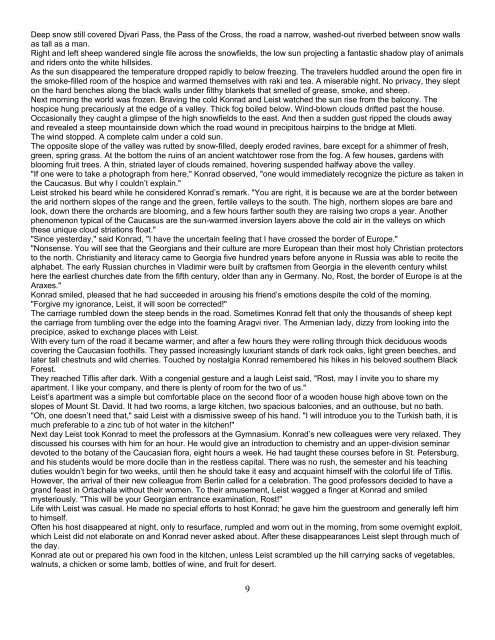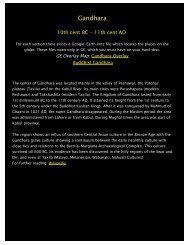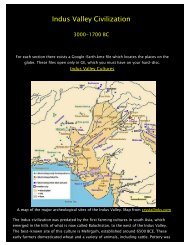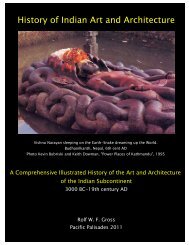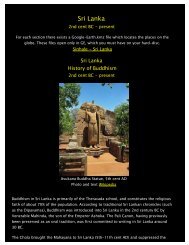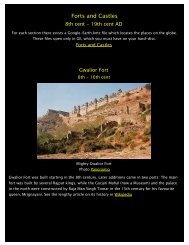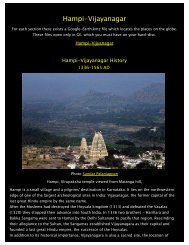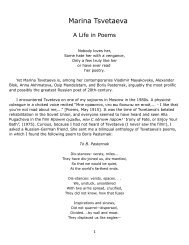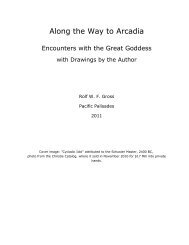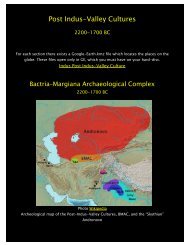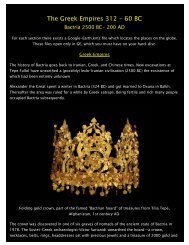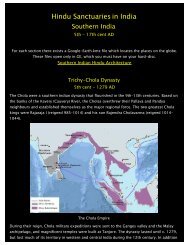Kazbeg, higher than Montblanc, <strong>and</strong> the peaks of Khevsureti further east, only one road crossed the range, theCaucasian Military Road.The rug merchant, obviously a veteran of many such trips, had pulled his bowler hat over his eyes <strong>and</strong> slept soundly inhis corner of the carriage, undaunted by the shaking <strong>and</strong> rocking on the rutted road. Leist read a time-worn Alex<strong>and</strong>erDumas novel. The child had put her head into her napping mother’s lap.The carriage labored up the Terek Valley. Numerous medieval watchtowers crowned the bare rocks on both sides, <strong>and</strong>after an hour the coach <strong>and</strong> the roaring river disappeared between steep rock walls.Leist put down his book, waved his h<strong>and</strong> at the passing scenery, <strong>and</strong> said. "Now begins the dramatic Daryan Gorge, thePorta Caspiae of the Ancients. Since prehistoric times people have migrated through this narrow defile <strong>and</strong> over the Passof the Cross. Another name for these gorges was the ‘Gates of the Alani,’ <strong>and</strong> in fact, to this day the Osseti, the remainsof Gothic tribes, occupy these remote valleys. They speak an ancient Indo-European language."They crossed a bridge to a posting station in an old fort under an overhanging rock. Local tribesmen in heavy shepherds’cloaks, armed with silver daggers <strong>and</strong> front-loading guns loitered around the station. Surprised, <strong>Konrad</strong> commented upontheir blue eyes."Oh, yes," Leist said with a laugh, "these are the famous ‘Blue Eyes of the Mountain Georgians’. Ethnically they are Indo-European Ossetis not Georgians, but they have mixed with the Georgians with beguiling results: imagine a statuesquewoman with black hair <strong>and</strong> these unreal, deep-blue eyes!"Hardly enough room remained for the road next to the roaring river in the canyon. The road got steeper, <strong>and</strong> the horseslabored hard.Unexpectedly a side valley opened on the end of which Mt. Kazbeg majestically towered over a craggy glacier.At the end of the gorges the river fanned out across a rock-strewn floodplain where thous<strong>and</strong>s of sheep grazed in thesparse grass along its banks. A group of wild shepherds squatted next to a two-wheeled cart around a smoking fire. Intheir high, conical, fur hats <strong>and</strong> dirty, long-haired, sheepskin coats, their black, bearded faces <strong>and</strong> tousled, matted hairlooked medieval. Barking <strong>and</strong> snapping, the scrawny sheep dogs attacked the coach. The horses reared, <strong>and</strong> the driver,cursing in Russian, furiously whipped at the dogs, while the shepherds watched idly, laughing <strong>and</strong> shouting obscenities.Soon they were surrounded by a sea of wooly sheep. Led by stinking, evil-eyed billy goats, <strong>and</strong> driven from behind byshepherds on horseback, the animals surged in waves around the carriage. Caught, the carriage had to wait until theherd had passed. The second coachman got off his box <strong>and</strong> walked ahead of the horses to part the woolly sea likeMoses with a broom.Around noon the road eased, <strong>and</strong> they reached the village of Kazbegi. Like a huge shepherd’s hat the mighty ice mass ofKazbeg’s volcanic hulk rose majestically over the verdant valley. Driven by high winds, continuously changing thin cloudsveiled its glaciated peak."We break here for lunch," said Leist. "Let me take you to the only restaurant in this place. It is grubby, but they servereal Georgian food that one cannot find in Tiflis, <strong>and</strong> from its terrace one has a fine view of the mountain."Unaccustomed to the altitude, breathing heavily they clambered the steep hill to the restaurant. Green meadowsstretched across the valley, a few houses at the foot of a bare hill crowned by the black silhouette of a church against thewhite snow fields of Kazbeg.Leist pointed at the church. "One of Georgia’s most celebrated l<strong>and</strong>marks: Mtatsminda Zameba Kazbegis. The HolyMountain of the Trinity at Kazbegi. Sometimes you should visit it in late July when the rhododendrons are blooming fromthe church right to the edge of the Ortisferi Glacier. The view of Kazbeg from there is exceptional, <strong>and</strong> the meadowssurrounding the church are covered with rare Caucasian gentians <strong>and</strong> primulas."The eatery was a cave far dirtier than <strong>Konrad</strong> had expected <strong>and</strong> full of smoke from the fire. They fled onto the terrace.With a sly smile at <strong>Konrad</strong>, Leist ordered fa meal or both of them in Georgian."This is going to be your introduction to Georgia! A test of your fortitude. Nowhere else but at Alaverdi in November canyou find such freshly made khashi. You absolutely must try it."<strong>Konrad</strong> was surprised by a simple bowl of clear broth served with thick, circular loaves of flatbread <strong>and</strong> a saucer ofchopped garlic. A few innocent looking bones <strong>and</strong> cartilages swam in the bowl. He tasted the first spoon <strong>and</strong> gagged.Leist gloated with laughter! The broth was revolting. Mutton leftovers seasoned with huge amounts of grated garlic.Not to spoil Leist’s pleasure, <strong>Konrad</strong> pulled himself together <strong>and</strong> bravely swallowed the soup. It did have an unexpectedlypleasant effect on his queasy stomach.<strong>Konrad</strong> shook himself. "Now I am a fully seasoned Georgian, reeking of garlic!" Leist, pleased with his experiment,grinned <strong>and</strong> patted <strong>Konrad</strong> on the back: "Rost, you are a splendid fellow!"For a while the road was passable. They skirted a fortified village, Sioni, with a watchtower <strong>and</strong> an old basilica on a steeppromontory in a large, barren mountain bowl. Behind Kobi, a village populated by long-legged, black pigs <strong>and</strong> peoplewho looked like robbers, the road became much worse.In a desolate scree of red rocks the road deteriorated into a washboard of rivulets fed from the last snowfields on theslopes. Primitive wooden galleries, supposed to protect the road from avalanches, which had half collapsed during thewinter forced them into often hair-raising maneuvers.8
Deep snow still covered Djvari Pass, the Pass of the Cross, the road a narrow, washed-out riverbed between snow wallsas tall as a man.Right <strong>and</strong> left sheep w<strong>and</strong>ered single file across the snowfields, the low sun projecting a fantastic shadow play of animals<strong>and</strong> riders onto the white hillsides.As the sun disappeared the temperature dropped rapidly to below freezing. The travelers huddled around the open fire inthe smoke-filled room of the hospice <strong>and</strong> warmed themselves with raki <strong>and</strong> tea. A miserable night. No privacy, they slepton the hard benches along the black walls under filthy blankets that smelled of grease, smoke, <strong>and</strong> sheep.Next morning the world was frozen. Braving the cold <strong>Konrad</strong> <strong>and</strong> Leist watched the sun rise from the balcony. Thehospice hung precariously at the edge of a valley. Thick fog boiled below. Wind-blown clouds drifted past the house.Occasionally they caught a glimpse of the high snowfields to the east. And then a sudden gust ripped the clouds away<strong>and</strong> revealed a steep mountainside down which the road wound in precipitous hairpins to the bridge at Mleti.The wind stopped. A complete calm under a cold sun.The opposite slope of the valley was rutted by snow-filled, deeply eroded ravines, bare except for a shimmer of fresh,green, spring grass. At the bottom the ruins of an ancient watchtower rose from the fog. A few houses, gardens withblooming fruit trees. A thin, striated layer of clouds remained, hovering suspended halfway above the valley."If one were to take a photograph from here," <strong>Konrad</strong> observed, "one would immediately recognize the picture as taken inthe Caucasus. But why I couldn’t explain."Leist stroked his beard while he considered <strong>Konrad</strong>’s remark. "You are right, it is because we are at the border betweenthe arid northern slopes of the range <strong>and</strong> the green, fertile valleys to the south. The high, northern slopes are bare <strong>and</strong>look, down there the orchards are blooming, <strong>and</strong> a few hours farther south they are raising two crops a year. Anotherphenomenon typical of the Caucasus are the sun-warmed inversion layers above the cold air in the valleys on whichthese unique cloud striations float.""Since yesterday," said <strong>Konrad</strong>, "I have the uncertain feeling that I have crossed the border of Europe.""Nonsense. You will see that the Georgians <strong>and</strong> their culture are more European than their most holy Christian protectorsto the north. Christianity <strong>and</strong> literacy came to Georgia five hundred years before anyone in Russia was able to recite thealphabet. The early Russian churches in Vladimir were built by craftsmen from Georgia in the eleventh century whilsthere the earliest churches date from the fifth century, older than any in Germany. No, Rost, the border of Europe is at theAraxes."<strong>Konrad</strong> smiled, pleased that he had succeeded in arousing his friend’s emotions despite the cold of the morning."Forgive my ignorance, Leist, it will soon be corrected!"The carriage rumbled down the steep bends in the road. Sometimes <strong>Konrad</strong> felt that only the thous<strong>and</strong>s of sheep keptthe carriage from tumbling over the edge into the foaming Aragvi river. The Armenian lady, dizzy from looking into theprecipice, asked to exchange places with Leist.With every turn of the road it became warmer, <strong>and</strong> after a few hours they were rolling through thick deciduous woodscovering the Caucasian foothills. They passed increasingly luxuriant st<strong>and</strong>s of dark rock oaks, light green beeches, <strong>and</strong>later tall chestnuts <strong>and</strong> wild cherries. Touched by nostalgia <strong>Konrad</strong> remembered his hikes in his beloved southern BlackForest.They reached Tiflis after dark. With a congenial gesture <strong>and</strong> a laugh Leist said, "Rost, may I invite you to share myapartment. I like your company, <strong>and</strong> there is plenty of room for the two of us."Leist’s apartment was a simple but comfortable place on the second floor of a wooden house high above town on theslopes of Mount St. David. It had two rooms, a large kitchen, two spacious balconies, <strong>and</strong> an outhouse, but no bath."Oh, one doesn’t need that," said Leist with a dismissive sweep of his h<strong>and</strong>. "I will introduce you to the Turkish bath, it ismuch preferable to a zinc tub of hot water in the kitchen!"Next day Leist took <strong>Konrad</strong> to meet the professors at the Gymnasium. <strong>Konrad</strong>’s new colleagues were very relaxed. Theydiscussed his courses with him for an hour. He would give an introduction to chemistry <strong>and</strong> an upper-division seminardevoted to the botany of the Caucasian flora, eight hours a week. He had taught these courses before in St. Petersburg,<strong>and</strong> his students would be more docile than in the restless capital. There was no rush, the semester <strong>and</strong> his teachingduties wouldn’t begin for two weeks, until then he should take it easy <strong>and</strong> acquaint himself with the colorful life of Tiflis.However, the arrival of their new colleague from Berlin called for a celebration. The good professors decided to have agr<strong>and</strong> feast in Ortachala without their women. To their amusement, Leist wagged a finger at <strong>Konrad</strong> <strong>and</strong> smiledmysteriously. "This will be your Georgian entrance examination, Rost!"Life with Leist was casual. He made no special efforts to host <strong>Konrad</strong>; he gave him the guestroom <strong>and</strong> generally left himto himself.Often his host disappeared at night, only to resurface, rumpled <strong>and</strong> worn out in the morning, from some overnight exploit,which Leist did not elaborate on <strong>and</strong> <strong>Konrad</strong> never asked about. After these disappearances Leist slept through much ofthe day.<strong>Konrad</strong> ate out or prepared his own food in the kitchen, unless Leist scrambled up the hill carrying sacks of vegetables,walnuts, a chicken or some lamb, bottles of wine, <strong>and</strong> fruit for desert.9
- Page 3 and 4: Table of Contents1. My Grandfather'
- Page 5 and 6: 1.My Grandfather's Watch among the
- Page 7: ditch beside the road.Mother was tr
- Page 11 and 12: "But you know nothing about how to
- Page 13 and 14: newborn baby! You won’t need a ba
- Page 15 and 16: Dadiani bent over the table, reache
- Page 17 and 18: Autumn had come to Georgia, and it
- Page 19 and 20: "Gespenstisch!" whispered Mouravi t
- Page 21 and 22: Finally, depressed by his inability
- Page 23 and 24: They slowly rode up the hill north
- Page 25 and 26: On their way back to the Lavra Alex
- Page 27 and 28: Blushing like a young girl, she gav
- Page 29 and 30: Alexandra bowed deeply to a middle-
- Page 31 and 32: All applauded and Ilia made a small
- Page 33 and 34: She had done her hair up in a new w
- Page 35 and 36: ape her. But then he must die, and
- Page 37 and 38: a rear door when she entered.If Per
- Page 39 and 40: Alexandra went purple with embarras
- Page 41 and 42: The smell of roasting lamb wafted t
- Page 43 and 44: Konrad quietly sat back. To his gre
- Page 45 and 46: The tall, dark-haired woman began w
- Page 47 and 48: She kissed him."Maybe you dream of
- Page 49 and 50: 14.Tuscany - the Wolfsons' House in
- Page 51 and 52: ut are, unjustly, much more famous.
- Page 53 and 54: Alexandra had fallen into melanchol
- Page 55 and 56: She kissed him tenderly. "Niko, I a
- Page 57 and 58: obligations, and she, ever since th
- Page 59 and 60:
months, was flooded with the diffus
- Page 61 and 62:
could they be aroused into communal
- Page 63 and 64:
19.An unexpected encounter with Vla
- Page 65 and 66:
chauffeur drop me at the station ju
- Page 67 and 68:
She described her sensation of flyi
- Page 69 and 70:
sky a thin, transparent blue. Imbed
- Page 71 and 72:
interest in Theosophy."Marti shrugg
- Page 73 and 74:
to?Mother had never mentioned any d
- Page 75 and 76:
"Ah, of course, of course, ‘Eine
- Page 77 and 78:
Konrad agreed that this sounded mor
- Page 79 and 80:
patriarchal oak and smiled, a littl
- Page 81 and 82:
have a similar situation in our vil
- Page 83 and 84:
Alexandra disagreed. "Most abortive
- Page 85 and 86:
a limited edition, hand-screened ma
- Page 87 and 88:
Alexandra touched her necklace and
- Page 89 and 90:
close!"She had hugged him, tears ru
- Page 91 and 92:
The others came lumbering up the st
- Page 93 and 94:
urden the heart with this task, whi
- Page 95 and 96:
the colors mixed and changed depend
- Page 97 and 98:
28.Kandinsky's suprising confession
- Page 99 and 100:
With kisses Alexandra removed the v
- Page 101 and 102:
He knelt, removed her knee and leg
- Page 103 and 104:
Joachim viewed Konrad with sympathe
- Page 105 and 106:
The rumbling continued at regular i
- Page 107 and 108:
Russia."She picked up a piece of br
- Page 109 and 110:
conservative pessimism, demanded th
- Page 111 and 112:
preventative method and taking it e
- Page 113 and 114:
new provocation in modern music and
- Page 115 and 116:
exhausted the Renaissance idea of b
- Page 117 and 118:
creative clairvoyance, and her shar
- Page 119 and 120:
Left to herself, Alexandra, awed, w
- Page 121 and 122:
public. She fended off the fuzzy wo
- Page 123 and 124:
ailways on strike. The strike had t
- Page 125 and 126:
Grandfather was very sad when he fo
- Page 127 and 128:
and put on his coat and shoes, he r
- Page 129 and 130:
Alexandra not in the mood to give V
- Page 131 and 132:
crowd of the fashionable and the ma
- Page 133 and 134:
established tradition with some mil
- Page 135 and 136:
42.Uncle Muravi's Benz, Tiflis1907"
- Page 137 and 138:
equisitioned a locomotive to take t
- Page 139 and 140:
meaningless rituals. That may be on
- Page 141 and 142:
lacking. I like this man, and at th
- Page 143 and 144:
are suitably ambiguous."45.The Dadi
- Page 145 and 146:
think of Munich or something else p
- Page 147 and 148:
He showed them the room where they
- Page 149 and 150:
death."Alexandra was more intereste
- Page 151 and 152:
they fought over the offering. The
- Page 153 and 154:
flew off cawing.Claudia grabbed Ale
- Page 155 and 156:
Together they were hedging out a pl
- Page 157 and 158:
the right of women to own their bod
- Page 159 and 160:
The Chinese wife of a sinologist at
- Page 161 and 162:
these texts."However, Ch'an is the
- Page 163 and 164:
times, but moved back together agai
- Page 165 and 166:
survived the Bolsheviks, the Fascis
- Page 167 and 168:
physically overwhelm her. Despite h
- Page 169 and 170:
Konrad picked up Alexandra at the t
- Page 171 and 172:
Abruptly her vision had narrowed, a
- Page 173 and 174:
the Kwadjagani, the Masters of Wisd
- Page 175 and 176:
somewhat, his back was still bent,
- Page 177 and 178:
century. The characteristic Chinese
- Page 179 and 180:
Alexandra was relieved and happy, a
- Page 181 and 182:
subconscious past her observant min
- Page 183 and 184:
Dahl leaned back in surprise. "This
- Page 185 and 186:
visions reappear. Entire armies mar
- Page 187 and 188:
"This method is not easy, I have ne
- Page 189 and 190:
He had started with representationa
- Page 191 and 192:
His hair had turned completely whit
- Page 193 and 194:
Overnight the mood in St. Petersbur
- Page 195 and 196:
daughter. His wife had left him no
- Page 197 and 198:
which was presented to him—with a
- Page 199 and 200:
"From the soldiers whom I took care
- Page 201 and 202:
He watched Alexandra’s doubting m
- Page 203 and 204:
lond, bony girl whose gray eyes loo
- Page 205 and 206:
call it intellectual humanism. It d
- Page 207 and 208:
time I asked this question I had me
- Page 209 and 210:
"I spent most of the winter of 1918
- Page 211 and 212:
We buried him in the cemetery at G
- Page 213 and 214:
ways. Corruption became the way of
- Page 215 and 216:
68.A Concert in Kreuth - Eliso1989I
- Page 217 and 218:
Eliso listened with increasing fasc


